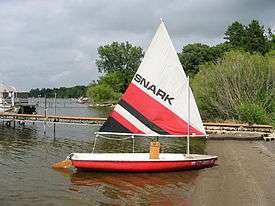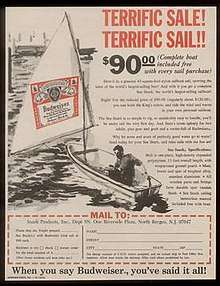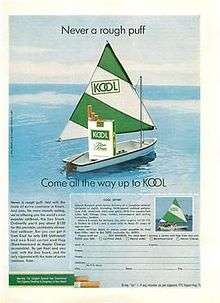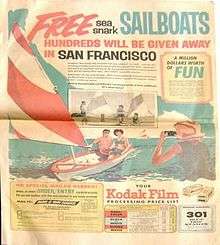Snark sailboat
The Snark is a lightweight, two-person, lateen-rigged sailboat manufactured and marketed by Meyers Boat Company of Adrian, Michigan. The Snark was initially marketed by Snark Products, Inc. of Fort Lee, NJ and has been marketed with numerous slight variations, prominently as the "Sea Snark, "Super Snark", and Super Sea Snark.
 | |
| Boat | |
|---|---|
| Crew | 2 |
| Draft | 12 in (0.30 m) |
| Hull | |
| Hull weight | 50 lb (23 kg) |
| LOA | 11 ft (3.4 m) |
| Beam | 3 ft 2 in (0.97 m) |
| Sails | |
| Mainsail area | 45 sq ft (4.2 m2) |
The sailboat was marketed heavily in numerous co-branding campaigns. The New York Times reported that the Sea Snark outsold all other sailboats in 1970[1] – and that over 48,000 Sea Snarks were sold in an 18-month period in 1971 via a mail order campaign with Kool Cigarettes.[2] By 1973, over 200,000 Sea Snarks had been sold[3] and the New York Times reported that by 1976 that Snark had built more sailboats than any other manufacturer.[4] The manufacturer currently estimates that nearly a half million[5] Sea Snarks have been manufactured since 1958.[6]
Noted for its 11' expanded polystyrene hull and marketed as "unsinkable," a 1971 Popular Science reviewer doubted there was a sailboat "more foolproof."[7] Originally, the purchase of a Sea Snark included a 16 page booklet on 'how to sail,'[8] and a 1975 Popular Science article described the Sea Snark as the least expensive and lightest sailboat on the market.[9]
Design
Early Sea Snarks featured an unclad one-piece injection-molded EPS hull and weighed a total of approximately 30 lbs. Later versions called the Super Snark or Super Sea Snark featured a vacuum formed layer of ABS (later ASA)[7] bonded over the EPS hull for a total weight of 50 lbs. Snark Products had patented the cladding process (which they marketed as "stronger than fiberglass")[10] to eliminate the possibility of voids within the injection molded hull. Under Snark Products Inc., the technology was marketed as Corelite[7] and is now trademarked as Armorclad.
Sea Snarks (currently "Super Snarks" or "Super Sea Snark) have a monohull length of eleven feet; beam of thirty-eight inches; draft of .17 foot; and weight capacity of 310 lb. Features include a lateen-rigged nylon sail of 45 square feet; aluminum mast, spar, and boom; wood rudder and an integral center sleeve molded into the hull to support a removable wood dagger board. With an overall depth of 12 inches, the sailboat can be stored upright in a depth of 12 inches, and the boat is described as "car-toppable."[11] The boat arrives as a knock down kit in a cardboard box. Assembly requires approximately one hour.[7]
Later in 1974 a slightly larger version of the Super/Sea Snark was created called the Sunflower model features yellow ABS cladding as well as a covered foredeck (or "splash deck"). As of 1974, Sunflower had been revised with its hull two inches wider, sides two inches higher, and 23% more sail area (mast 15 inches taller but same boom length) than the currently marketed Super/Sea Snark. However the Sunflower sails slower in all conditions as compared to the Sea Snark/Super Snark. Also due to its larger sail it's also less stable in strong winds. Sunflowers were North American Yacht Racing Union (NAYRU) class certified[7] and a Sunflower was displayed along with other American recreational equipment in a 1974 U.S. Information Agency exhibit touring Russia.[12] Sales of this boat have been significantly less than the Super/Sea Snark.
History

Snark Products Inc. was co-founded by Jim McMullen in Fort Lee, NJ.[13] For the sailboats primary construction, Snark outsourced the EPS injection molding to a company in Connecticut; later expanding to its first production facility in Port Clinton, Ohio on lake Erie[13] in order to bring the work in-house. McMullen would later conceive successful marketing tie-ins for the sailboat, including the award winning Kool cigarettes campaign.[13]
Snark Products marketed the boats to Montgomery Ward and Sears (as the Whirlwind,)[14] the latter becoming the company's largest client,[13] as well as to hundreds of dealers across North America and internationally to licensed dealers in Japan, Germany, UK, and Canada.[13] Snark Products Inc. provided licensees with manufacturing molds and marketing materials.[13]
In 1972, McMullen sold Snark Products to Doyle Dane Bernbach (now DDB Worldwide),[13] the world's third largest advertising agency, keeping a two-year management tenure.[13] DDB subsequently sold the company to San Francisco-based Kransco. Boat manufacture moved between several locations, including Virginia Beach.[3] In 1984, Lockley purchased Snark from Kransco, merging the two companies, to be subsequently purchased by Entwistle of Hudson, MA. Entwistle manufactured the boats in New Castle, Pennsylvania. In 1996, Snark was purchased by Meyers Boat Company and production moved to Adrian, Michigan.[13]
Super/Sea Snark did not have an official class association until 2014 when the Super Sea Snark Sailing Association was started in the hopes of bringing Sea Snark/Super Snark sailors together. This organization also established the official class rules. To learn more visit superseasnark.com . In 1993 US Sailing Association established the Portsmouth Rating (also known as the Portsmouth Yardstick' (PY) or Portsmouth handicap scheme) for those racing the Snark against other non-snark sailboats. One can view the class rules and Portsmouth Ratings at superseasnark.com class website.
Marketing


The 'unclad' Sea Snark retailed for $119, the Super Snark/Super Sea Snark with its yellow ABS cladding was marketed at Sears in the late sixties and early seventies for $199.[10] A 1971 ad in Boating magazine called the Sunflower "the Volkswagen of Sailboats."[10]
In 1971, Kool cigarettes initiated an advertising campaign where consumers could mail order a Snark with the Kool logo on the sail – for $88 (later $99) along with one KOOL carton flap – which included delivery. These were early (non-ABS) versions and retailed at the time for $120. As one of KOOL's highest scoring ads, the company received over 18,000 orders for "Sea Snarks" in 1971 and the campaign was repeated in 1972.[15] The Snark/Kool campaign won a national POPI award (given by the Point of Purchase Institute) as the most creative and inventive ad of 1971.[13] The KOOL Snark promotion was repeated in 1972, adding the option of credit card payment, and again in 1975 for $139.
The Snark was used as a promotional tie-in with numerous companies including Coca-Cola, Vicks and Budweiser.[13] In 1968, the San Francisco Chronicle ran ads for Mail-a-way, offering Snark sailboats as a giveway in a promotion of their Kodak film processing service.
References
- "Advertising: D.D.B. Becomes Own Client". The New York Times, Philip H. Dougherty, November 11, 1971, p. 69.
year ago the agency acquired Snark Products Inc., Fort Lee N.J. And Joseph R. Daly, president of the agency, will be happy to tell you (as he told us yesterday) that the low-priced Snarks outsold other boats last year. The company more than tripled its sales to $3.33 million, and expects to make more money this year than it did during its 10-year history. Those figures all have to do with the sale of It's Sea Snark ($119), Sunflower ($199), and the Triumph ($349) all sailboats, but doesn't include sales by Sears of the private-label Jetwind.
- "Advertising: D.D.B. Becomes Own Client". The New York Times, Philip H. Dougherty, May 2, 1978, p. 49.
Incentives can run from the products of Al's Goldfish Lures... to Snark Product's sailboat, which once went for $88 for Brown and Williamson's Kool cigaretttes. 48,000 were sold over a period of 18 months.
- "Ohio Firm Chooses Beach". Virginia State Chamber of Commerce, 1973, Volume 40, p.36.
Snark Products Inc., a builder of small sailboats, is moving its U. S. manufacturing operations from Port Clinton, Ohio, to Virginia Beach. The North Bergen, N.J.-based firm is a subsidiary of Doyle, Dane, Bernbach Inc., a New York advertising agency. More than 200,000 boats of its first model, called the Sea Snark, have been sold to date, Mr. Bruce said.
- "There is a Small Sailboat for Everyone". The New York Times, January 11, 1976, p. 15, author R.G.B.
The Snark people (makers of the Sunflower, Mayflower, Wildflower and all the little Snarks) have undoubtedly made more sailboats than anyone else.
- "Snark". Meyers Boat Company.
- "Sea Snark (Super Snark)". Sailboatdata.com.
- "Sea Snark". Popular Science, November 1971, p. 131.
- "Snark Products". Motorboating, January 1969.
- "Set Sail for under $1000, Swimsuit Sailboats". Popular Science, June 1975, p. 66.
- "The Volkswagen of Sailboats". Boating, Jan-May 1971.
- "The 57th Annual New York Boat Show". European Stars and Stripes, January 31, 1967, Page 12.
If the prices lack appeal, take heart. There are still companies willing to set you afloat for less than $100. A fine example of budget boating is the lightweight, unsinkable Sea Snark for those who like to sail close to the water, and who don't mind winding up in it occasionally. Some 35,000 of the cat-rigged little craft were marketed to date, according to Jim McMullen of Snark Products, Fort Let, N.J. The display models of the sprightly 11-footer were getting plenty of attention from the family trade and people who like to take a car-topper on shore trips and vacations. The hull weighs only 30 pounds and stores in 12 inches of clearance against a wall in shed or garage. It is a one-piece affair made of the same kind of expanded plastic used in life preservers, but compressed more firmly. The Sea Snark come with an aluminum mast, spar and boom, plus 45 square feet of sail, for only $99.75, and McMullen insists the plastic hull is so rugged "you couldn't crack it if you tried."
- "Outdoor America... Inside Russia". Popular Mechanics, 1974, p. 99.
- "History of Snark Sailboats". Sailboatstogo.com.
- "Sears and Roebuck, Whirlwind 11". Sailboatdata.com.
- "Kool Brand History". Tobaccodocuments.org. Archived from the original on 2014-07-14.
Also in 1971, KOOL initiated a self-liquidator campaign whereby consumers were given the opportunity to purchase an 11-foot sailboat with carried KOOL 1ogo and usually sold for $120. Consumers could purchase a "Sea Snark" for $88 and one KOOL canon and flap. The purpose of the offer was to increase the effectiveness of the ad; it was one of KOOL's highest scoring ads and was used again in 1972. KOOL received over 18,000 orders for "Sea Sharks" in 1971. A POP test was conducted in 1971 comparing the "Sea Snark" floor display with a non-liquidator KOOL display. Stores using the ordinary display failed to increase sales enough to justify the $6.00 store payment. KOOL sales re "Sea Snark" display rose enough to more than cover the display payment and cost. KOOL's Sea Snark promotion was repeated in 1972, adding option payment through charge cards. 1975: The Sea Snark offer was repeated in a self-liquidator campaign for $139.